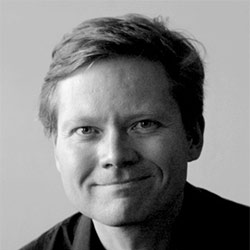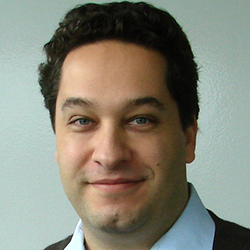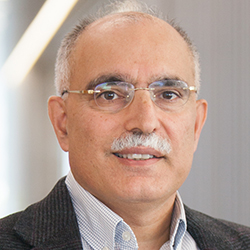Furthering Connections at Argonne Visit Day
On January 9, Northwestern Computer Science welcomed collaborators from Argonne National Laboratory to discuss potential research intersections
Scientists and engineers at Northwestern University and the US Department of Energy’s Argonne National Laboratory have cultivated impactful collaborations, leveraging key strengths and complementary capabilities to advance strategic and emerging fields — including advanced materials; biological and environmental systems; computer, computational, and data science; energy; and water.
Established in 2011, the Northwestern Argonne Institute of Science and Engineering (NAISE) builds and supports partnerships among NAISE members, fellows, students, and post-doctoral scholars through opportunities such as scientist exchanges, joint research projects, educational programs, internships, and streamlined access to facilities.
In addition, Argonne and Northwestern are founding partners of the Trillion Parameter Consortium – a global network of scientists from federal laboratories, research institutes, academia, and industry which aims to address the challenges of building large-scale artificial intelligence (AI) systems and advancing trustworthy and reliable AI for scientific discovery.
On January 9, Northwestern Computer Science hosted Argonne Visit Day to explore potential research intersections among Argonne scientists and faculty members, students, and postdocs. NAISE codirector and Argonne Distinguished Fellow Pete Beckman, Valerie Taylor, director of the Mathematics and Computer Science Division (MCS), senior computer scientist and research development leader Franck Cappello, and senior computer scientist Nicola Ferrier joined the day-long workshop, organized by Northwestern Engineering’s Peter Dinda and Nikos Hardavellas.
“We were incredibly fortunate to host top researchers in computing and mathematical sciences from Argonne National Laboratory,” said Samir Khuller, Peter and Adrienne Barris Chair of Computer Science at Northwestern Engineering. “We are delighted to find more common research themes and expand our collaboration with Argonne researchers.”
Part of an ongoing series of events starting in November 2023, Argonne Visit Day engaged 24 computer science and computer engineering faculty members and ten PhD students. Prior events featured talks by Argonne personnel including Rajeev Thakur, Argonne distinguished fellow and deputy director of the Data Science and Learning Division, and computer scientist Yanfei Guo. In addition, members of the Northwestern and Argonne community attended the PhD defense presentation by Michael Wilkins (PhD '23), whose thesis work involved close collaboration with Argonne’s Exascale Computing Project.

The program schedule included introductions to Argonne and Northwestern CS, a technical talk given by Beckman and Ferrier, faculty lightning talks, a PhD student meeting, small group faculty meetings, and a brainstorming session on joint opportunities.

Program
Khuller presented welcome remarks and provided an overview of the department, including recent faculty hires, CS+X initiatives, and strategic research areas. He also underscored the importance of the department’s collaborative research enterprise.

Taylor and Beckman outlined current strategic research drivers at Argonne, including the interconnected systems of the computing continuum — from the Internet of Things to edge computing to high-performance computing to instrumentation like the advanced photon source. They also discussed Argonne’s research capabilities in foundational research and applied computation work in domains including energy-efficient high-performance computing, quantum computing, and microelectronics.
Tech talk
To illustrate the significant computation-focused collaboration between Northwestern and Argonne, Beckman and Ferrier discussed Sage, a project funded by the National Science Foundation to build the cyberinfrastructure for distributed, intelligent sensor networks. The sensor nodes are collecting and analyzing data essential for understanding the impacts of global urbanization, natural disasters, and climate change on natural ecosystems and the built environment.
The multi-institutional team led by Northwestern University is developing new techniques for applying machine learning algorithms to the staggeringly large volumes of data processed by open-source software built for embedded computers connected directly to the sensor systems, which include high-resolution and infrared cameras, microphones, and weather and air quality stations. Data from the edge computation are then transmitted to a cloud computing infrastructure which is accessible in real-time by the public.
Now part of NSF’s National AI Research Resource (NAIRR) pilot program, Sage testbeds are deployed in California, Montana, Colorado, and Kansas, in the National Ecological Observatory Network, and in urban environments in Illinois and Texas.
Beckman encouraged the workshop attendees to get involved with Sage’s experimental platform ¬ by, for example, developing AI algorithms, or investigating problems related to computer vision, continuum programming models, networking, run-time systems, and scheduling.
“The infrastructure allows computer scientists to experiment,” Beckman said. “People can actually write code and try things out.”
